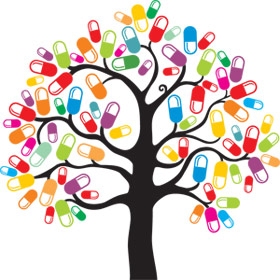
Vitamins Intake with Water: Do we really need vitamins?
From chewable Flinstone's to Centrum Silver, it seems as if every age group is targeted for vitamin use. And, with new multivitamins for men, women, seniors, children, athletes, and more, it seems that the vitamin market is booming. Health stores in malls and shopping centers seem to be flourishing too. But still, many people seem underinformed about vitamins and if we really need them. And if so, what, how, and when to take them. In this brief article, we'll look at some of the main vitamin types, what they do for the body, where they can be received from, and more.
Vitamins themselves do not give the body energy. However, they are chemical compounds that aid in important metabolic processes. There are many vitamins inside the food we eat, but the typical Western diet does not account for the amounts we really should be taking.

There are 13 vitamins that can be divided into two categories: water-soluble and fat-soluble. Water-soluble vitamins, with the exception of B12, can be supplied by plants in the diet. This type of vitamin is not stored in the body for a very long time, which means it needs to be consumed regularly. Primarily, and scientifically speaking, water-soluble vitamins serve as coenzymes in metabolic reactions. The majority of the water-soluble vitamins are 'B' vitamins, which play a role in energy metabolism. They also include thiamin, riboflavin, niacin, pyridoxine, folic acid, and vitamin C. Thiamin is important in metabolizing carbohydrates, riboflavin can help oxidize fatty acids among many other things, niacin helps change fat to glucose, pyridoxine helps with metabolism, folic acid is involved in DNA and protein synthesis (the DNA portion of this is probably why many women trying to conceive take folic acid supplements), B12 helps in fatty acid metabolism and finally, vitamin C serves as an antioxidant in addition to several other uses. As you can see, the processes these vitamins aid a great deal in everyday body function. Many of the foods we eat and drink contain these vitamins. But sometimes, we may not consume enough of those foods and need to take a vitamin. For example, milk is one of our greatest sources of riboflavin, but the lactose intolerant and vegans are missing out. Also, meat and fish are the only sources of B12.
Many medical conditions can come from vitamin deficiencies. Or, in some cases, vitamins are used to treat some conditions. Those with anemia, a blood disorder, are often given B12. Those who lack enough thiamin become fatigued because the body isn't making enough energy. Scurvy is caused by a vitamin C deficiency. Also, many symptoms of alcoholism are treated with this vitamin. Niacin is used to treat Down's Syndrome, autism, diabetes, and depression.





